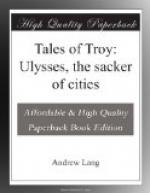Moreover, the Greeks for long never seem to have tried to break down one of the gates, nor to scale the walls, which were very high, with ladders. On the other hand, the Trojans and allies never ventured to drive the Greeks into the sea; they commonly remained within the walls or skirmished just beneath them. The older men insisted on this way of fighting, in spite of Hector, who always wished to attack and storm the camp of the Greeks. Neither side had machines for throwing heavy stones, such as the Romans used later, and the most that the Greeks did was to follow Achilles and capture small neighbouring cities, and take the women for slaves, and drive the cattle. They got provisions and wine from the Phoenicians, who came in ships, and made much profit out of the war.
It was not till the tenth year that the war began in real earnest, and scarcely any of the chief leaders had fallen. Fever came upon the Greeks, and all day the camp was black with smoke, and all night shone with fire from the great piles of burning wood, on which the Greeks burned their dead, whose bones they then buried under hillocks of earth. Many of these hillocks are still standing on the plain of Troy. When the plague had raged for ten days, Achilles called an assembly of the whole army, to try to find out why the Gods were angry. They thought that the beautiful God Apollo (who took the Trojan side) was shooting invisible arrows at them from his silver bow, though fevers in armies are usually caused by dirt and drinking bad water. The great heat of the sun, too, may have helped to cause the disease; but we must tell the story as the Greeks told it themselves. So Achilles spoke in the assembly, and proposed to ask some prophet why Apollo was angry. The chief prophet was Calchas. He rose and said that he would declare the truth if Achilles would promise to protect him from the anger of any prince whom the truth might offend.
Achilles knew well whom Calchas meant. Ten days before, a priest of Apollo had come to the camp and offered ransom for his daughter Chryseis, a beautiful girl, whom Achilles had taken prisoner, with many others, when he captured a small town. Chryseis had been given as a slave to Agamemnon, who always got the best of the plunder because he was chief king, whether he had taken part in the fighting or not. As a rule he did not. To Achilles had been given another girl, Briseis, of whom he was very fond. Now when Achilles had promised to protect Calchas, the prophet spoke out, and boldly said, what all men knew already, that Apollo caused the plague because Agamemnon would not return Chryseis, and had insulted her father, the priest of the God.




